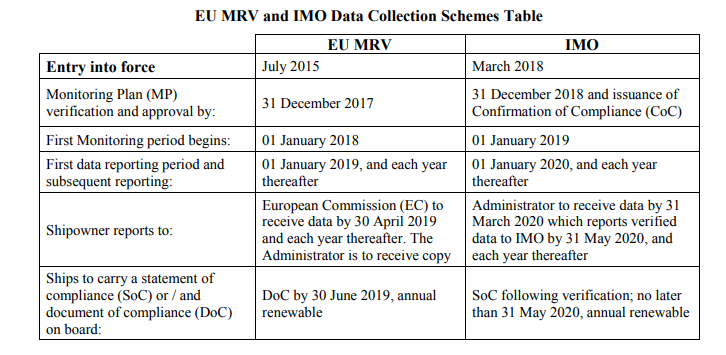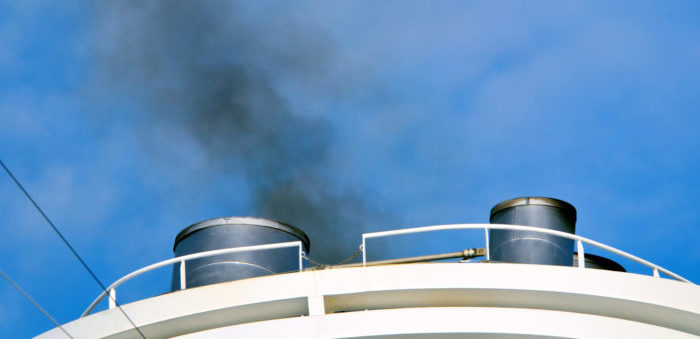The Republic of the Marshall Islands (RMI) issued guidance for compliance with both the global IMO data collection system for fuel oil consumption of ships and the EU system for Monitoring, Reporting, and Verification (MRV). The document underlines that these two data collection schemes are not harmonized. They have different start dates, different annual reporting/ certification deadlines, require different data parameters to be reported, and will run parallel, at least for some limited time.
The European Commission, however, proposed that once the legal framework for the IMO global data collection scheme (DCS) is established, an amendment will be made to the EU MRV Regulation to achieve alignment with the international global scheme.
Below is a table of consolidated dates relevant to the EU MRV and IMO DCS as they currently stand:

EU MRV
- The EU MRV scheme entered into force on 01 July 2015 and requires shipping companies to establish a Monitoring Plan (MP) for data collection, to provide reports measuring the quantity of Carbon dioxide (CO2) emissions from individual ships, per voyage for every voyage touching on an EU port, on an annual basis. The MP is subject to verification by an accredited independent verifier in accordance with EU Regulation 2015/757.
- The EU MRV applies to all foreign-flagged ships of more than 5000 GT, for all voyages conducted into, between, and out of EU and European Free Trade Association (EFTA) States’ (Norway and Iceland) ports. EU ports also include ‘outermost regions’ which are ports that are not geographically within Europe, but because they are under the Administrative control of an EU member State, they are considered an EU port of call, like the Azores, Canary Islands, Madeira, Martinique, Guadeloupe, French Guyana, Saint-Martin, Mayotte, and Reunion.
- Reporting exceptions include stops solely for:
- refueling;
- taking on supplies;
- crew sign on and off;
- dry docking;
- making repairs to the ship or its equipment;
- ships needing assistance or in distress;
- ship-to-ship transfers carried on outside port limits;
- taking shelter from adverse weather; or
- those made necessary by search and rescue activities.
- The first step for ship owners and operators should be to prepare a ship-specific MP for fuel consumption data collection and CO2 emissions for each of their ships.
- Ship owners have three (3) options for verification pursuant to Regulation (EC) No. 765/2008 by either:
- their own Recognized Organization (RO), if accredited by a National Accreditation Body (NAB) recognized by the EC;
- another so accredited RO; or
- an EC-authorized third-party, independent accredited verifier.
- The emissions and transport work data for each calendar year should be consolidated in an annual report, which would then be verified by an independent, accredited verifier by 30 April of each following year.
- Initial data collection period began on 01 January 2018.
- The Template for the Emissions Report (ER) is detailed in Annex II of EU Regulation 2016/1927.
- The first annual reporting is due by 30 April 2019. Each subsequent year thereafter, reports are due on 30 April.
- Once the annual report is compiled and verified, the report is submitted by the shipowner to the EC, with a copy sent to the Administrator.
- Following annual report verification, verifiers will issue a DoC to demonstrate compliance (EU 2015/757, Articles 17 and 18).
- Verifiers must inform the EC and the Administrator, without delay, of the issuance of any DoC.
- By 30 June 2019 and 30 June of each year following the end of subsequent reporting periods, ships arriving at, within or departing from an EU port, and which have carried out voyages during that reporting period, must carry on board a valid DoC.
- By 30 June each year, the EC will make publicly available the information on CO2 emissions reported.
IMO DCS
- The IMO DCS entered into force in 01 March 2018 through amendments to MARPOL Annex VI.
- The IMO DCS is an international scheme that applies to all ships of 5,000 GT and above to which Chapter 4 of MARPOL Annex VI applies. Accordingly, the IMO DCS does not apply to ships not propelled by mechanical means, platforms including FPSOs and FSUs, and drilling rigs regardless of their propulsion.
- The IMO DCS requires the development of ship-specific data collection methodologies and data reporting processes to be included in a new Part II of the Ship Energy Efficiency Management Plan (SEEMP). The SEEMP Part II is to be developed, taking into account IMO Resolution MEPC.282(70), and verified for compliance with Regulation 22.2 prior to the ship’s first data collection period.
- RMI has authorized, in accordance with IMO requirements, only its ROs to:
- perform verification of the SEEMP Part II (Ship Fuel Oil Consumption Data Collection Plan) and issue a CoC;
- verify data collected from each ship operator, per ship;
- issue an Annual SoC upon successful completion of data verification; and
- submit/transfer data to the IMO Ship Fuel Oil Consumption Database.
SEEMP Part II Timely Verification
- Regulation 5.4.5 of MARPOL Annex VI requires the Administrator to ensure the SEEMP Part II complies with Regulation 22.2 “prior to collecting data under Regulation 22A of this Annex in order to ensure the methodology and processes are in place prior to the beginning of the ship’s first reporting period.”
- Neither Regulation 5.4.5 nor Regulation 22.2 of MARPOL Annex VI provides a phase-in period for early submittal of the SEEMP Part II for existing ships (delivered before 1 March 2018) to ensure sufficient lead-time for Administrations to carry out verification prior to the ship’s first reporting period. This has raised concerns about possible bottle-necking if a large number of SEEMPs are submitted for verification close to the 31 December 2018 deadline.
In order to ensure timely verification of the SEEMP Part II by its ROs, the Administrator strongly recommends that owners and operators of existing ships that will be subject to the IMO DCS submit the SEEMP Part II to its RO as soon as possible, but no later than 1 September 2018, in accordance with IMO Circular MEPC.1/Circ.876.






























































